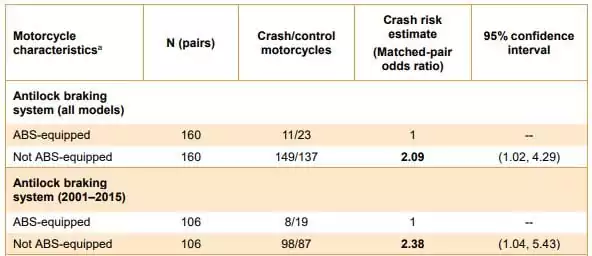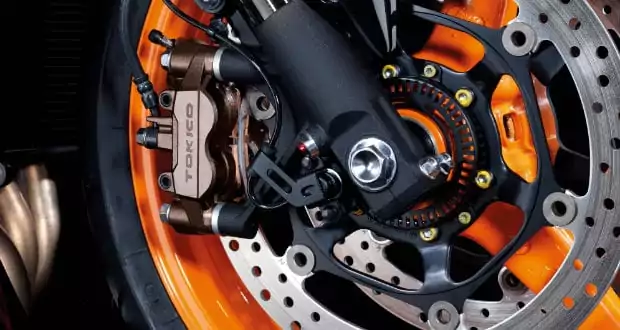The American Motorcyclist Association (AMA) is lobbying to make Anti-Lock Braking Systems (ABS) mandatory on motorcycles in the future, a move which is getting mixed reviews from the motorcycle world. The pitch was one of ten recommendations made in the AMA’s Select Risk Factors Associated with Causes of Motorcycle Crashes report in September 2018. The AMA positions the recommendation as a move designed to save lives, but it’s a little like the helmet debate: at the end of the day, should we have the right to make safety decisions for ourselves?
Watch the video
This video on mandatory ABS covers:
- Who’s pushing to make ABS (anti-lock brakes) mandatory
- What their reasoning is
- Why some riders are for or against mandatory ABS
- And what does this mean for riders in the USA and even Canada and Mexico

Click the little unmute button in the bottom left corner to unmute the video.

In Europe, ABS has been mandatory on motorcycles for two years now, but in North America, that isn’t at all the case. Typically what we’re seeing on this side of the ocean is the inclusion of both ABS-optional, and base/standard models brought in by manufacturers on a motorcycle’s front brake and back brake. The ABS-equipped models typically cost at least $500 and sometimes $1,000 more. Some market segments are seeing more ABS offerings than others. Cruisers, can you hear me?
Why should ABS be mandatory on motorcycles?
The arguments for ABS make sense and are valid ones. Here’s some eye-candy for number-geeks:

For those of you who are groaning because, ugh, numbers, man… essentially what we’re seeing is that motorcycles without ABS are 2.09 times to 2.38 times more likely to crash. Which is pretty crazy.
Obviously crashing comes with risk of injury and possibly death. I won’t get into the morbid stats on the number of motorcycle rider fatalities there are annually, as we probably already all know someone who’s passed, and it sucks. If you’re fortunate enough to walk away from your crash, you’ll still likely suffer from a bruised ego and a sore wallet when it’s time to pay for the repair bill. Bummer.
And then there’s the argument against mandatory ABS
In an industry that needs to see growth in ridership to stay afloat, do we really need to forcibly make motorcycling more expensive? More initial costs. More things which could go wrong or break and need to be replaced or service. Less human input, more technology doing the riding for you. More government telling us what our bikes have to have.
I’ve owned dozens of motorcycles, a handful of them came with ABS, and never once have I ever had the technology engage. That’s definitely a combination of good luck and good idiot-avoidance on my part. I suppose that one day ABS could come in handy, but I also enjoy the freedom and simplicity of motorcycles. The freedom to choose how I ride and care for and fix my machine. Doesn’t having one more rule imposed on our bikes seem kind of, counter-freedom-ish? Did just become the helmet argument 2.0?
 YouMotorcycle Motorcycle Blog – Motorcycle Lifestyle Blog, MotoVlog, Motorcycle Reviews, News, & How-Tos
YouMotorcycle Motorcycle Blog – Motorcycle Lifestyle Blog, MotoVlog, Motorcycle Reviews, News, & How-Tos

As a UK Driving Instructor, long standing biker and Police trained Advanced Driver, I cannot see the need to make ABS compulsory. Optional extra, by all means. One bike I owned back in 1983 was a Guzzi 850 T3 California, which had Guzzi’s ABS fitted to it as standard. I can honestly say, I never needed it. I do not need the ABS fitted to my Driving School car either. OK, it is fitted to every European car from 2001 on as standard, but apart from demonstrating it to students, I never rely on it. There can never be a substitute for driver/rider skills and ABS will not stop a motorcycle from crashing, the rider does. If the rider rides in a reckless or dangerous manner, NO amount of tech on his bike is going to save him from himself, so the claim that a bike with ABS is less likely to crash than a bike without ABS is, to my mind, a dangerous and misleading one. It is RASS that needs to be compulsory! (Rider Anti Stupidity System). It is more usually known as Commonsense!
I buy old bikes specifically avoid all the new technology. Yes, sometimes things like fuel injection are a plus, but give me an old carb on a MECHANICAL bike any day! They can keep the electronic, GPS oriented, computer tuned bikes. I want nothing to do with them!
Easy to say when you aren’t living in Canada, Debbi! Try having temperatures around or below freezing for most of the year and you’ll be writing little love letter poetry to your fuel injectors every day when you switch over haha.
Lost my sister in an accident that she was thrown off the bike when the back tire locked up and the tire locked out. So have to say I’m all in favour, I traded in my bike for one with abs brakes immediately after reading the accident report.
I am a 20,000 mile per year rider and my bike’s ABS system has activated maybe a half-dozen times per year in a traffic or deer-caused panic stop. I think I have pretty good riding skills and engage front and rear brakes judiciously, but there is always that sudden surprise and having the ABS for traction control helps make those surprises an exciting story instead of a visit to a hospital. I won’t ride a bike without it, but I don’t think ABS should be mandatory. Riding carries some risk, mostly to the rider, and they should be able to chose what level of risk they want to carry.